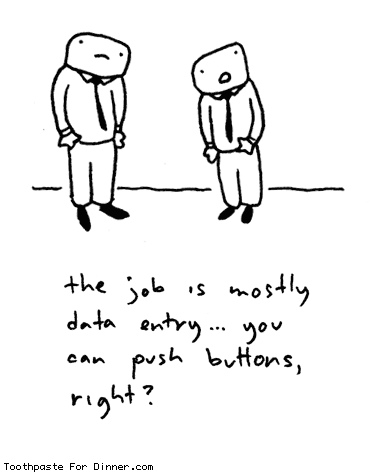
I love pushing buttons and clicking things and ARIS has given me a whole new set of buttons to click on.
I clicked the button to find the eight grade NYS assessments. After conferring with a colleague, I even think I understand them.
In my class of 35 students (over sized at the moment), I have three 2s and two 1s. In my class of 33, I have one 4, four 2s and one 1. The T class, which is combined with one of the other two will add four more students split with 2s and 3s. I also realized that the T class will be very over sized as these kids are just an addition to the already existing classes. I wonder whether this is a problem that will be rectified or a new way the Bloomberg/Klein regime found to legally create over sized classes.
I thought 3s were okay until I talked to an colleague from an intermediate school and she convinced me otherwise. I've heard the 2s and 1s know almost nothing.
What I would like to know is why an $80 billion computer like ARIS can't come up with a program that will put like abilities together. The poor kid with the 4 will be sitting in a class with kids who can't add. What kind of education will he get? With 34+ kids, there is no way to differentiate enough to help the child with the 1.
Somebody else better start pushing some buttons and start getting these kids in the right classes. I've got the data at my fingertips but I have no clue as to how to use it to help these kids.

5 comments:
The trouble is that people hate tracking. What they don't realize is that it's done EVERYWHERE where quality educations are given. THey ought to visit Yeshiva of Flatbush HS, where kids in the bottom of their class go on to big name schools. They openly track according to how well you do on the Board of Jewish Education exam. And somehow my friends who were in the lowest class now run businesses and work as architects, engineers, etc. So long as you give every class an equal education -- at the pace the class needs -- it works out. Oh, and people PAY to send their kids to a school which tracks them...
But we can't track. We need to abandon the upper level kids and get them to help us pull the bottom level up!!
If we could the powers that be (read: morons in charge) to realize tracking works if you reeveluate the track every year..... AAAARGGGHHH
At the beginning of last year I had a class that was mostly bordering on sheltered, but my honors kids were mixed in and then they added 9 special ed kids in the sixth week and the SPED teacher so we could co-teach.
Now, THAT was rough. I was irritated but we are a brand new school and since we are a true SLC, we have fewer options as to where to put kids. However, I agree with you completely that it is impossible to not lose the lower and highest kids and teach to the middle. Even worse, in LAUSD it doesn't matter if a kid passes English 9, they go on to English ten and so forth. This means in 11th grade English I can have kids who failed 9th and 10th.
IT IS SO FRUSTRATING! I can say that putting the honors level kids with my special ed worked best because I taught to the honors and those kids tended to be kinder, less frustrated with school, and therefore more helpful.
Good luck...I'm holding my breath for tomorrow when I see what my load looks like. I believe I will start blogging more actively once again after tomorrow. And if it's really bad, expect password protected rant posts :)
While it's OK for the private schools, religious schools, and even charter schools to track, the DOE officially holds to a simplistic notion of heterogeneous grouping.
There may even be legislation that, in effect, mandates heterogeneity.
The current response is to use differentiated instruction which as many of us know is failed approach in many ways. For example, the kids are not as patient with each other or the teacher trying to run around. Also, as the kids get older and fall further and further behind, trying to use differentiation is just ridiculous to implement. Finally, note there isn't that much material available to sensibly and differentiate on a daily basis in every subject.
Yet, even some of our more thoughtful colleagues think that heterogeneous grouping is desirable. Evidently years ago some "studies" were done that "showed" that heterogeneous groups can succeed. Sadly those studies didn't account for other contributing factors and / or those pointing to those studies did really understand how studies are done and how to use them.
A Scarsdale teacher friend, for example is a big believer in hetero. but he fails to recognize that in his school's version of hetero. the importance of small class size and strong parental support are key factors.
Pissed off:
I wrote an article on what middle school student Math levels really mean.
http://chaz11.blogspot.com/2009/06/new-york-state-math-test-for-middle.html
Post a Comment